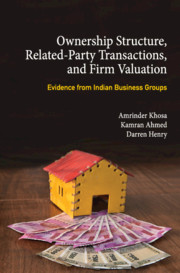 Ownership Structure, Related Party Transactions, and Firm Valuation
Ownership Structure, Related Party Transactions, and Firm Valuation Book contents
- Frontmatter
- Contents
- List of Tables
- 1 Introduction
- 2 The Evolution of Business Groups, Institutional Framework in India, and Related-Party Transactions
- 3 Theory and Literature Review
- 4 Hypotheses Development
- 5 Research Methods
- 6 Descriptive Statistics
- 7 Empirical Results
- 8 Additional Tests
- 9 Implications of the Study and Conclusion
- Appendix 1 List of Sample Firms
- Appendix 2 List of Business Groups
- References
- Index
9 - Implications of the Study and Conclusion
Published online by Cambridge University Press: 26 April 2019
- Frontmatter
- Contents
- List of Tables
- 1 Introduction
- 2 The Evolution of Business Groups, Institutional Framework in India, and Related-Party Transactions
- 3 Theory and Literature Review
- 4 Hypotheses Development
- 5 Research Methods
- 6 Descriptive Statistics
- 7 Empirical Results
- 8 Additional Tests
- 9 Implications of the Study and Conclusion
- Appendix 1 List of Sample Firms
- Appendix 2 List of Business Groups
- References
- Index
Summary
This last chapter discusses the key findings, the implications of the research findings, avenues for future research, and provides concluding remarks. The coverage begins with a summary of the key findings followed by the discussion on the implications of this study. The next section highlights the contributions of the study. The last section provides directions for future research and concluding remarks.
Key findings
One of the most important challenges to the governance structure of family-controlled firms is to limit controlling shareholders from extracting private benefits at the cost of the minority shareholders. This study investigates the influence of ownership structure on the MVE in Indian business groups. As for firm-level ownership structure, the study considers three main features: (a) direct ownership of controlling shareholders; (b) indirect ownership of controlling shareholders, and (c) minority ownership. Moreover, the use of RPTs as a means of entrenchment is examined.
Given the importance of principal–principal conflict in family-controlled firms, this study seeks to address those issues by providing answers to several critical questions. Table 9.1 highlights the key research questions and main findings of the study.
The finding of a non-linear association between the indirect ownership rights and firm value is broadly in agreement with the view that indirect ownership is employed as a vehicle by controlling families to extract private benefits in India. Bertrand et al. (2002) and Douma et al. (2006) critically analyse the role of cross-holding in group-affiliated firms. RPTs affect firm value negatively, especially in the presence of indirect ownership rights of the controlling shareholders. This finding raises questions on inadequate regulations pertaining to RPTs. OECD (2012) also raises concerns over inadequate regulatory requirements pertaining to RPTs and the role of independent directors in approving such transactions. Such concerns have led to significant changes under the Companies Act, 2013 and SEBI Listing Requirements, which include shareholder approval for all material RPTs and the availability of an e-voting facility for all shareholder resolutions.
- Type
- Chapter
- Information
- Ownership Structure, Related Party Transactions, and Firm ValuationEvidence from Indian Business Groups, pp. 143 - 151Publisher: Cambridge University PressPrint publication year: 2019


